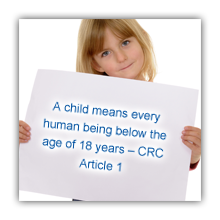Navigation and Service
Jump to:
The UN Convention on the Rights of the Child
In 1989 the UN General Assembly adopted the Convention on the Rights of the Child (CRC). The CRC brings together, within one instrument, all the children’s rights previously articulated in other international, human rights instruments. The Convention extends the human rights recognised for adults to explicitly include children from birth up to age 18. The Convention views children not as objects of compassion or pity, but as subjects of human rights under international law. Children are seen as active participants in their own development and agents of change.
At the same time, the CRC recognises that children’s status in society, as dependent on adults, gives rise to interests that are different from adults, as well as to specific forms of vulnerability requiring special protection. The Convention obliges the State and other responsibility holders (parents, guardians, care-givers, civil society, etc) to address the needs and interests of children as entitlements or rights.

